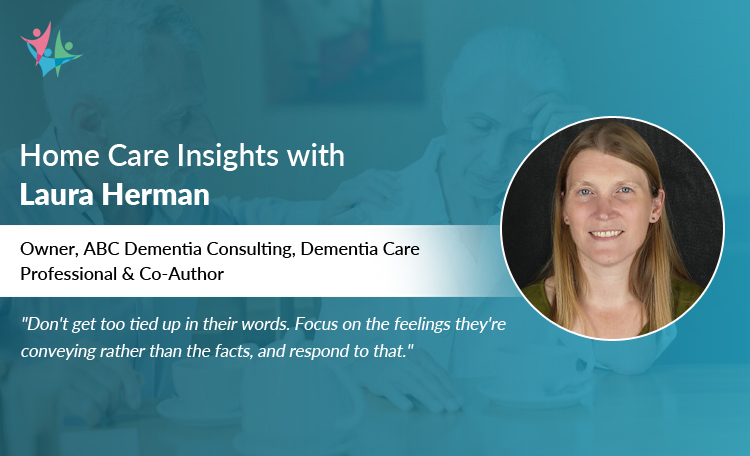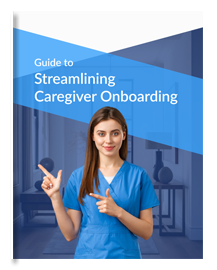In Conversation with Laura Herman to Bring Her Insights on Supporting Dementia Seniors
Caring for seniors with dementia is a heartfelt journey, demanding patience and kindness. Dementia, a challenging puzzle, alters memories and daily life. Caregivers and healthcare professionals step in as guides, weaving a comforting cocoon of understanding.
In this space, forgotten stories find a voice, and lost moments are rediscovered through compassionate gestures. Care isn’t just a duty; it’s a gentle artistry honoring the essence of each individual. Amidst the complexities, caregivers offer stability and warmth, illuminating the lives of those they care for.
In this simplicity of care, dignity and connection thrive, reminding us of the profound impact of love and empathy in the face of adversity.
To shed some light on the same, we interviewed a home care industry expert to bring her perspective on dementia care to light.

Who Did We Interview?
Laura Herman has served people with dementia and their families for 25 years. She’s spent a lifetime learning about mental-emotional health, behavioral communication in dementia, leading caregiving teams, raising children, and triumphing over caregiver burnout – and she’s realized that all humans feel and function at their best when their needs are met.
She’s developed a simple system for uncovering the messages hidden in the behavior of people with dementia, which can enable professional and family caregivers to understand their career needs better and help them thrive. Learn how to understand and Appreciate Behavioral Communication in Dementia in the ABC Dementia Course & Community at ABC Dementia.org.
Let’s get started with knowing what our expert thinks of the home care industry:
Question 1: What, in your opinion, can caregivers do to support seniors with dementia?
There are two main areas where people can focus on providing the best support to older adults with dementia.
First, educate yourself.
The choices and decisions you make can have a huge impact on your overall experience. But you don’t know what you don’t know! You’ll have to learn to go with the flow to some extent. But by learning all you can about what to expect and how to plan appropriately, you can influence your experience and the person you support.
Secondly, committing to becoming your caregiver is vital, too.
It is only sustainable to care for someone long-term if your needs are also met. If not, you’ll eventually grow very tired and depleted. It’ll impact your decision-making ability, emotional state, immune system, patience, and creativity…. All the things you need to show up at your best for your loved one. This, in turn, can contribute to more challenges for them in terms of sleep, behavior, and overall health.
So, set up a good support system and respite plan before you need it. Many caregivers think they can’t do these things because of financial barriers. It’s not easy. It takes creativity. But solutions are out there. Find someone who can help you figure it out. It’s absolutely worth it.
Question 2: Do dementia patients need to make certain lifestyle changes to minimize the impact?
People with dementia, like all of us, feel and function at our best when their needs are met. Setting up daily routines that support their holistic needs will greatly impact how well they can live with the condition.
Because of the demands of caregiving, many caregivers focus mainly on the basics, like toileting, eating, and safety. However, people with dementia are human beings with the same robust range of needs we all share.
Incorporating daily physical activity, a healthy diet, healthy sleep patterns, regular social interaction, and personally meaningful activities throughout the week will profoundly affect how well they fare.
Question 3: How should family members and caregivers communicate with dementia patients?
Dementia affects how much stimulation a person can process and how quickly. Try to reduce as much unnecessary stimulation as possible. That means turning off the TV or music or finding a quiet environment without much noise, activity, or other distractions. Use fewer words, and keep sentences simple and direct. Give them a lot of time to respond.
Pay very close attention to non-verbal communication – yours and theirs. Only about 7% of communication is verbal. 93% is body language, facial expression, and tone of voice. They’re more reliant on theirs and more attuned than ever to yours.
Don’t get too tied up in their words. Focus on the feelings they’re conveying rather than the facts, and respond to that.
Question 4: Do caregivers and family members need to take certain steps to make the elderly’s house dementia friendly?
There are a lot of ways that families can make a home more dementia friendly. Setting it up is vital to reduce the chance of falling and support their independence. Ask the doctor about an OT/PT home safety evaluation. It’s best to find one familiar with the needs of people with dementia.
More and more technology solutions are changing the landscape of dementia care at home as well, like GPS tags that can help quickly locate a person who has become lost.
Question 5: What advice do you give caregivers dealing with dementia in older adults?
Caregiving can be one of the most challenging parts of a person’s life but also one of the most richly rewarding. It’s possible to set yourself up for a smoother experience. Educate yourself, commit to caring for yourself, and set up a support system with guidance for the future.
Final Words
Taking care of seniors with dementia is a thoughtful process that emphasizes kindness and patience. Combining medical know-how with unwavering support creates spaces where happiness and connection still exist. Although challenges exist, the immeasurable rewards of maintaining dignity and enhancing life’s quality push us forward.
Every small act of kindness and effort to improve their well-being adds to the bigger picture, making our society more compassionate. It’s about understanding, empathy, and making every day brighter for those who need it most.
